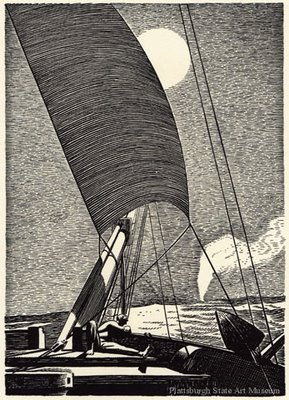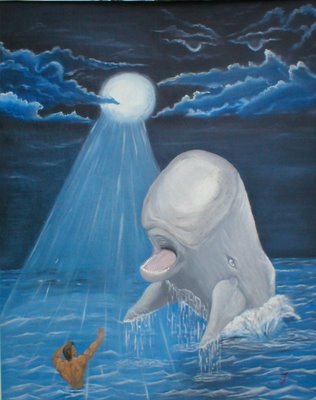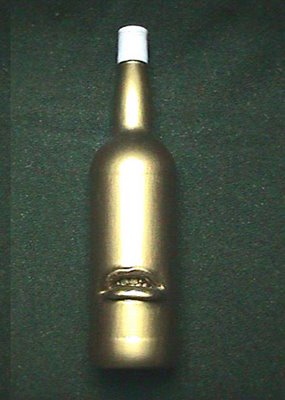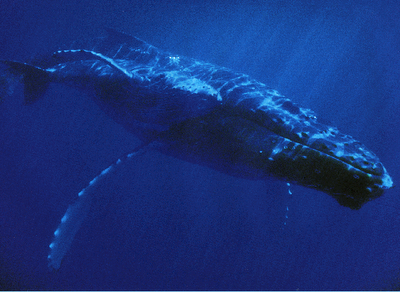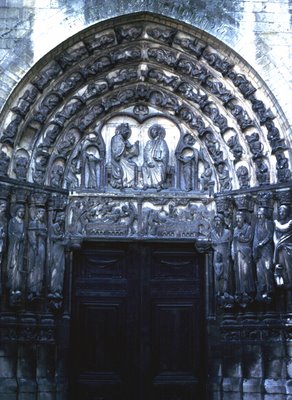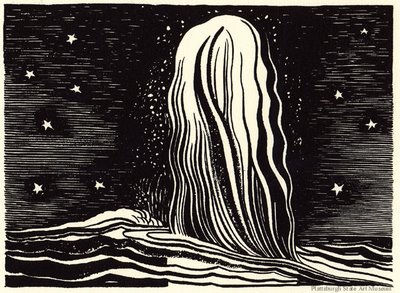Lights Out

Freud, on the ground shared between wit-formation -- let’s say the poem -- and dream-work: “A foreconscious thought is left for a moment to unconscious elaboration and the results are forthwith grasped by the conscious
perception.” (“Wit and its Relation to the Unconscious”)
***
Or, to put it more succinctly, a la Melville:
Suddenly as he peered down and down into its depths, he profoundly saw a white living spot no bigger than a white weasel, with wonderful celerity rising, and magnifying as it rose, till it turned, and then there were plainly revealed two long crooked rows of white, glistening teeth, floating up from the undiscoverable bottom.
-- Moby Dick

LIGHTS OUT
I turn the lights out
and I don’t know what
then will appear to
happen, only that it
will, up from some sill
or porch or yawning
vault I encounter
in my dangle down
an ink-dark drown.
No wonder I got
drunk the way I
did; plenty horrors
in a whiskey glass,
freakshow ‘bysms,
atheistic moons
benighting Plath’s
yew coffin, -yes:
but lots of ass down
there in the dregs,
in the bottomless part
of black thirst.
The trick I learned
from that fool
drunkalogue is
that you cannot
have one: cannot
pry an angle of descent,
cannot know too well
the brine procedure
as you drift on down
or else device
confuses way with
means, missing
thus what sparks
or spears. Then
you end up settling
for the same old
thrash, your baleen
gears fluking
up the trash of
all your past failed
efforts. The way gets
narrower down the years
it’s said; it sure seems
so in this writing,
so much already said,
so many old rooms
so harrowed that
entering them yet
again takes words
of the wildest order,
descending thus
on older skeins,
holding onto
some manta’s dream
of seafloor empire
with a heat
so strange and bold
as to startle this
plump burgher cortex
into flinging verses
further off the ledge.
More difficult, yes,
but simpler too,
the vatic keel
beneath the tongue
become a salty sailor
of black seas,
clicking and clabbering
the darker sounds
in the back reaches
of the brine like a
blue belle sibylling
up in the hayloft
getting it but good
up through her vent
from dread Apollo’s
Hyperborean wolf wurst.
Outside in our garden
at 4:30 a.m. three votives
glow on through
the fag ends of the night,
preternatural lanterns
my similes liken to
three teeth in a the
tripod of a rictus smile
welcoming you to my
house of sloshing dreams:
A big plastic pumpkin
roaring orange light
from our front stoop;
a black witch whitely
amping the arch
beneath a golden dewdrop;
a smiling cat up
from a fat pumpkin
streaming phosphor
between the withered
branches of the butterfly
bush and a sadly
spent penta.
They’re luminaries
from that ravaged suburb
in the boneyard
which merries up
my diving song,
divining the inside
glow which no
one refutes or knows.
Denounce no writhing
creature in the
thick loam God has
loined on the
undersides of words:
I hurl my verbs
from sole to tongue
onto the furrowed page,
laying in a thick hot sperm
rich in lesser gems
and stranger coins,
remitting with a
spasm an entire
river’s length
back to the sea
I woke from. The
song thus is shore
to what begins
and begins again;
I sing because
there is no
succincter way
to resphincter what
that Sphinx herself
swore when
I plunged my
words into the
bunghole of it all
down there.
I sing because
there’s laughter tears
& dreams between
the enchantment
of the lines,
swooning me to
the sidhe of endmost
ways where words
fail and fly
at once, three times
the wrong way round
the barrows of blue freeze.
I sing that I may
wake full frontal
to a day made wider
and wilder by my
singing. I sing for that
moment before first
light when something
unseen unseemly
& wholly unaccounted
for rouses up and
out my mouth like
Moby’s breeched white
length, the biggest
hardon of the deepest
seas, a straight assent
to every verb in heaven
which perforce here
smashes down all
boats and ‘burbs
with a colossal
white Amen.
I’m giving it to her again
with this wild white pen
tucked in his feral grin.

SEA FOREST
2003
Dark life. Confused. Tormented,
incomprehensible and fabulously
rich and beautiful.
-- Tennessee Williams
Huge wood I can neither
resist nor enter. Danger
and wrong the petals
of a heavy blue orchid.
My breakage an artery
hurling toward your breasts.
Elusive verb radiating nouns
like scent. Milky hour of
beachside enactment leading
to death & that float
in blue waters of we.
Ink which disappears
the closer I get to writing
the actual bed. Itch and fever
of the violate child. My war
with the gods of no and without.
Summer afternoons
which build and slake are
still distant; for now, this
high heat which has too
much pressure, like bright
balls clanging against
off every pendulate roll,
heave, sashay. All of it zipped
yet pent, waiting,
plotting, grinding teeth
as the day groins on.
Most difficult angel, You
belong most to the God
inside these raw words. The
poem about sex is a water
horse at noon: the fleet
shade of shadows narrowed
to that hour’s high drone.
A roar like a wave like
a wound like a man
at his meat, grilling over
an unrepentent fire
burning everywhere at once.
A door opens, the blue
mystery resumes
as I tumble down and down
what’s under the heart,
the sky, the summer,
the page, one fin to write
with and endless teeth below.

BLACK TORC
2005
How perilously close to nothing
is this black hour, where every
walking numen drifts drowned
in sleep’s thrall
and the garden dances stiffly
in the trance of black-wet leaves,
each petal burdened with the freight
of such a night at such an hour.
How strange and difficult
and wild the woman gathered
there in the center, keeping
time with her silent clapping,
her eyes cajoling, her ears
tuned to dead-dark music
spooring from this pen,
calling for black blood.
This rigor is almost,
perhaps already dead,
who can say? The step from
the ledge is not one you can see
with the tongue or say with the ear
but you must infer it anyway,
reaching out with your blackest
foot. You have to trust, in the
way of all dark divines,
that this night’s black tide
seen frmo her side below
and within is a starry
promenade, a shoe for
hooves which torcs
the dream which lamps
the full moon now
sailing spectrally behind
rag-twisting-drippy skies.
Ah, how easy it is right here
to mistake rigor for death
and downwarding hues
for depth, I mean, to read
the moment way too corporally,
the same way I always lost the
key to women inside their thighs,
trying to bridge white shores
with on waves of soggy
too-penultimate sighs.
Easy and so perilous the way
because one misstep here
on the harp-strung siege
and it’s hair, nose and eyeballs
all the way down to the black
hag’s hut at the fag end of my worst
nights, where wolves and tarry
vulvas tear each other wide
in the spin of disco balls
and the gruesome enterprise
is right next to the whalish
rectum which remits
all suitors’ bones in the
sound of disco organum.
No matter how many times
I circumnavigate this hell,
the risk is ever in the wings,
just off the deep thought’s
mazing, fangs notched and
wide with a bite so literal
that it’s many lines before
I know my head’s behind
morselling one black throat
or another. So why keep sailing
toward Capes of blackest blue?
Why peramble paths on
naked feet that burn
with the sea’s most strident
coals? Why indeed? It’s 4:42 a.m.
on the Wednesday of a rag-ass
week when I have too much
else to do for faux gambling at
this hour with such Sioux-
Lakotan coin. So why?
I always ask the question
here when it seems I’ve
harrowed full enough the
next day’s dark and still not
found the torc it wears.
That’s why I call my efforts
black and leave the poem
so, one step further down and
round a way I’ll never fully
name, though I have infernal
clues. My job’s to ferry on
the freight of what may
be almost or ever dead,
pointless though it seem.
Rain is falling now so slightly
as to wake the dream or
wrap me in its wake.
Which is keel and which
black weather? And is
that the torc which gleams
it all in one throat, there
beyond what I tried
my best to say?

PETROGLYPH,
PLOW SCENE
2005
They wrote on rock what
they carved down into you,
dark mother, a pair of oxen hauling
the sacred nib of wood
across the loam, furrowing
the fecund lanes. A
tumescent figure strolls
behind, flinging wide
his sheaves of burning seed.
My motion then is oceans
old; the same labor hauls
this hand across the page
and down into the bladed
dark of 4 a.m., first prayers
issued from the heart
of my pen into Your halved
wake, revealed and reveled
mons, o res, o sidhe, o mound
of ever darker riper doors.
They wrote their
hard-earned mythos
down, harrowing their
tumuli with its first scribblings,
crying their music into a
lost, lightsoaked, spring-to-
early-summer morning whose
remains have settled here.
That sacral loam is so
thick and fresh at this hour
its ripeness caws from
every seam, balls-heavy,
blood-tanged, slightly
fishy and massively dark,
preternaturally so, packed
like bowels or funerary
urns with the riotous stink
of gods passing on from one
age to the next, nothing left
but ripeness yawning wide
and crying Yes in the lowest
registers of the night.
Who knows what gods begin
when the last line tides to this end?

MOTLEYED MELVILLE:
A MEDLEYy
2006
I.
Motleyed Melville is my gospel
or what’s left of it these
ebbing days: He was the
man of common rips
and sunders, failing Dad,
too dry a mother,
heading off to a sea’s
blue thunders leaving
behind bad days. He got
soaked in the salt of an
immensity which later
bid him write it down
and thus he launched
a fleet of novel frigates,
only one of which could
balance salt with vigorish
to clear his proper and
so fallen shores. That
once imagination and means
ruddered in him huge
and magisterial, mad and free
of portside damage and
Christian democracy.
That work hauled off
from every known shore
that had yet been said
and then wrecked him
in his deepest seas.
With no shore he
would paddle home to
he had little left to do
but curse indifferent
publics and fend on
with words once loud
grown drear into a
private man’s retiring
jail of drying verbs.
No wonder he burned
all his letters and
manuscripts, freeing
himself not of words
but of our lubber’s
sterile sense of them.
Thus Melville sailed on,
leaving us to bicker on
as we do about
all that loosened
from that descending
boat and beast -- modernist
prose, fascist manifesto,
gay sally, phrenology
of the sea’s broad fascias.
Only a smaller man could write
that one great book, a
doubter of all textures
yet delving all they yet
surround, like salt water,
abysms of the will to know
what madness renders
moot. Only a goodly ungodly
man could write of the
ungodly godlike one,
finding in faith’s faltering
fury enough to barb it to
the page and hold it there
in paragraphs of wilding wrench:
What else could Melville
do, having delved the full
bass octaves of the Whale?
And who, indeed, wrote
that Whale down, Melville
or Ahab; or did Moby
thus write them?
Melville sought to earn
a living writing down the
sea-tales of his youth
but for one book that
voyage mastered him;
he later said that two
books finned through
Moby-Dick, “the larger
book, and the intimately
better (one) ... for (his) own
private shelf,” or, vice versa,
the one which “demands his
ink” and the other “whose
unfathomable cravings drink
his blood.” He sought the white
whale but really Dick steered
that black book from behind,
a fin of sperm’s eternity which
was all a man of that day
could hook, perhaps ever.
Moby-Dick racked up some
500 bucks in sales and
was roundly panned by
the press, decrying its
wandering narrative,
snoozer asides,
fractured voices, doomed
ends. Then a warehouse
fire burned the inventory,
like a try-works burning
all the author had dreamed
of magnitude. And as
those books leapt into
fire, some darkness leapt
back into that author’s
ire, never to be found again.
II.
As the shamans of the
Buryat contend, the first
ones received their divine
fires directly from the
sky, and flew real horses
there; later generations
had to content with
ancestors, not divines,
and fly imagined skies.
So when I dare propound
the margins of the whale
I do in fished-out seas
where no one roars
with Ahab’s spleen, and
everyone calls themselves
Ishmael, paddling on
tidy self-graven caskets
over “all the stirs up
the lees of thing” in jobs
and wives and cats,
mowing not seas but lawns.
Last night I dreamed
of trading places with
the friend I left behind
who stayed to play in
bands -- He stepped out
of memory to assume this
chair, while I strapped
back on my blue guitar,
as far from that insouciant
two-bit rocker as the
hour of this night
to that one. And played
his songs again. I
poured over PA manuals
learning again to work
the sound & clopped
about town on crutches
saying farewell to my
wife & wondering just
how to rock the soak
of time’s abysmal pour.
Ahab’s not Melville,
nor Melville this man,
though some brogue
infernity dismasts and
mans us all and bids
us roar the wretched
night of wind and wave
that capsizes daily
enterprise & makes
of wreckage home.
At the cracks of doom
in the great below
scientists of late have
found vents that hiss
& swirl; and in that
total darkness they’ve
found colonies of
worms and crabs
thriving not on light
but heat’s bacterium.
Ahab’s down there,
harnessed forever to
Moby’s breast, and
Melville too, his book
on them strung around
his neck, book pages
opened to the gospel
Father Mapple intoned from
in his ship-shaped chapel
by the sea. That music’s
loud in my ear like the
roar of amplifiers I
once sailed upon, a
wilderness I hymn here
till the roaring’s done
with me, no matter
what the cost to
the paper man I dream.
I am thus obedient
in stepping off the ledge
to drown the seams
of sense and song
in this pure verbal sea:
For home is where
the heart sinks to,
and mine hunts dark
men ferally to
no longer placard
capitals of God or
gal or sea but the wild
lacunae of all three,
perfecting all they
wrought when they
self-ruined me. Thus
that motleyed Melville
is gnostic text enow
to keep the dark vents
burning and this
hand every churning
the oar-handle home
toward the next verboten
swirl of bubbles heading
down what’s left of prose
to the bottom where it grows.



